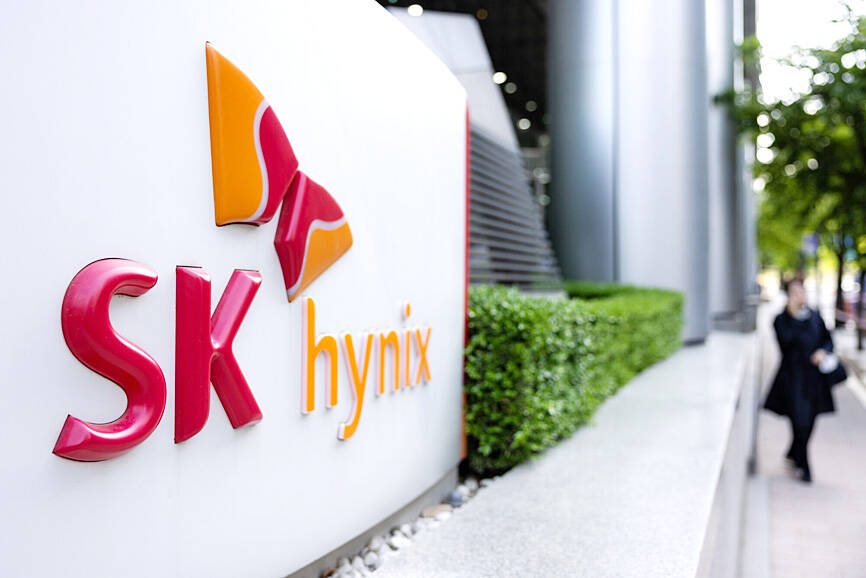SK Hynix Inc plans to spend about US$14.6 billion building a new memorychip complex in South Korea, preparing to meet rapidly growing demand for semiconductors employed in artificial intelligence (AI) development.
The company intends to set aside an initial 5.3 trillion won (US$3.9 billion) to begin constructing a new factory toward the end of this month, aiming for completion by November next year. The total investment on the site would surpass 20 trillion won as SK Hynix fits it out with equipment over the long term, it said in a statement.
SK Hynix, which is to report quarterly results today, is the leader in a type of advanced chip called high-bandwidth memory (HBM) tailored for AI, outcompeting Samsung Electronics Co.

Photo: Bloomberg
HBM chips work well with accelerators designed by Nvidia Corp, and SK Hynix foresees demand for HBM growing 60 percent annually in coming years, even as sales of regular DRAM climb alongside a proliferation of data centers.
The company plans to locate its newest plant close to its production base in Cheongju. It is also expanding in the US, with plans to spend US$3.9 billion on an advanced packaging plant and research center for AI products in Indiana.
SK Hynix is proceeding with other domestic investments including in the Yongin Semiconductor Cluster, where it is planning to inject about 120 trillion won in the long term.
Separately, Vietnamese tech giant FPT plans to build a US$200 million AI factory using Nvidia technology, the company said on Tuesday, as Vietnam aims to become a semiconductor and AI hub.
Long a low-cost destination to make clothes, shoes and furniture, Vietnam is now eyeing a rapid climb up the global supply chain and has put computer chips at the heart of its development plans.
“FPT is committed to digital transformation, AI, cloud, and education ... working to achieve its vision to turn Vietnam into an AI hub of the world through collaboration with Nvidia in technology, business development, and training,” FPT chairman Truong Gia Binh said in a statement.
The factory will help FPT "accelerate the construction and development of AI platforms and applications," he said.
As part of its collaboration with Nvidia, FPT plans to incorporate the US chip company's programs into university and high school curricula to develop high-tech human resources, aiming to reach at least 30,000 students within five years.
The statement did not give details of where the factory will be built.
Additional reporting by AFP

When an apartment comes up for rent in Germany’s big cities, hundreds of prospective tenants often queue down the street to view it, but the acute shortage of affordable housing is getting scant attention ahead of today’s snap general election. “Housing is one of the main problems for people, but nobody talks about it, nobody takes it seriously,” said Andreas Ibel, president of Build Europe, an association representing housing developers. Migration and the sluggish economy top the list of voters’ concerns, but analysts say housing policy fails to break through as returns on investment take time to register, making the

‘SILVER LINING’: Although the news caused TSMC to fall on the local market, an analyst said that as tariffs are not set to go into effect until April, there is still time for negotiations US President Donald Trump on Tuesday said that he would likely impose tariffs on semiconductor, automobile and pharmaceutical imports of about 25 percent, with an announcement coming as soon as April 2 in a move that would represent a dramatic widening of the US leader’s trade war. “I probably will tell you that on April 2, but it’ll be in the neighborhood of 25 percent,” Trump told reporters at his Mar-a-Lago club when asked about his plan for auto tariffs. Asked about similar levies on pharmaceutical drugs and semiconductors, the president said that “it’ll be 25 percent and higher, and it’ll

CHIP BOOM: Revenue for the semiconductor industry is set to reach US$1 trillion by 2032, opening up opportunities for the chip pacakging and testing company, it said ASE Technology Holding Co (日月光投控), the world’s largest provider of outsourced semiconductor assembly and test (OSAT) services, yesterday launched a new advanced manufacturing facility in Penang, Malaysia, aiming to meet growing demand for emerging technologies such as generative artificial intelligence (AI) applications. The US$300 million facility is a critical step in expanding ASE’s global footprint, offering an alternative for customers from the US, Europe, Japan, South Korea and China to assemble and test chips outside of Taiwan amid efforts to diversify supply chains. The plant, the company’s fifth in Malaysia, is part of a strategic expansion plan that would more than triple

Taiwanese artificial intelligence (AI) server makers are expected to make major investments in Texas in May after US President Donald Trump’s first 100 days in office and amid his rising tariff threats, Taiwan Electrical and Electronic Manufacturers’ Association (TEEMA, 台灣電子電機公會) chairman Richard Lee (李詩欽) said yesterday. The association led a delegation of seven AI server manufacturers to Washington, as well as the US states of California, Texas and New Mexico, to discuss land and tax issues, as Taiwanese firms speed up their production plans in the US with many of them seeing Texas as their top option for investment, Lee said. The